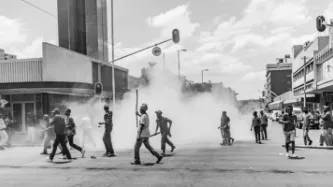Search
Content type: Case Study
amaBhungane is an independent, non-profit newsroom based in South Africa. amaBhungane plays a key role in exposing corruption, promoting transparency and accountability at all levels of government. In recent years, amaBhungane has been at the forefront of privacy litigation in amaBhungane Centre and Sole Stephen v. Minister of Justice and Correctional Services and others, a challenge to South Africa’s expansive surveillance laws.
Qn: Please briefly describe your work and the issues/…
Content type: Case Study
Facial recognition technology (FRT) is fairly present in our daily lives, as an authentication method to unlock phones for example. Despite having useful applications, FRT can also be just another technology used by those in power to undermine our democracies and carry out mass surveillance. The biometric data collected by FRT can be as uniquely identifying as a fingerprint or DNA. The use of this technology by third parties, specially without your consent, violates your right to privacy.
The…
Content type: Long Read
In December 2019, the Information Rights Tribunal issued two disappointing decisions refusing appeals brought by Privacy International (PI) against the UK Information Commissioner.
The appeals related to decisions by the Information Commissioner (IC), who is responsible for the UK’s Freedom of Information regime, concerning responses by the Police and Crime Commissioner for Warwickshire and the Commissioner of Police for the Metropolis (The Metropolitan Police) to PI’s freedom of information…
Content type: News & Analysis
On 29 May, Niger’s Congress voted on a law allowing for broad interception powers of certain electronic communications by the government. The bill makes it lawful for the government to approve the interception of communications without appropriate safeguards or oversight mechanisms.
The law passed with 104 votes – the Nigerien parliament has 171 members – without the participation of the opposition that boycotted the law. The opposition claimed that
the law will allow those, for…
Content type: Case Study
IMSI catchers – International Mobile Subscriber Identity catchers – are a particularly intrusive technology being used by police to monitor protesters and intercept their personal information and communications.
IMSI catchers have been used - officially or in secret - across the globe to monitor protests, including in the US and Germany; in the UK, police forces have refused to disclose any information on their use but documents obtained by the Bristol cable show that nine police forces have…
Content type: Long Read
The UK’s Metropolitan Police have began formally deploying Live Facial Recognition technology across London, claiming that it will only be used to identify serious criminals on “bespoke ‘watch lists’” and on “small, targeted” areas.
Yet, at the same time, the UK’s largest police force is also listed as a collaborator in a UK government-funded research programme explicitly intended to "develop unconstrained face recognition technology", aimed “at making face…
Content type: News & Analysis
In mid-2019, MI5 admitted, during a case brought by Liberty, that personal data was being held in “ungoverned spaces”. Much about these ‘ungoverned spaces’, and how they would effectively be “governed” in the future, remained unclear. At the moment, they are understood to be a ‘technical environment’ where personal data of unknown numbers of individuals was being ‘handled’. The use of ‘technical environment’ suggests something more than simply a compilation of a few datasets or databases.
The…






